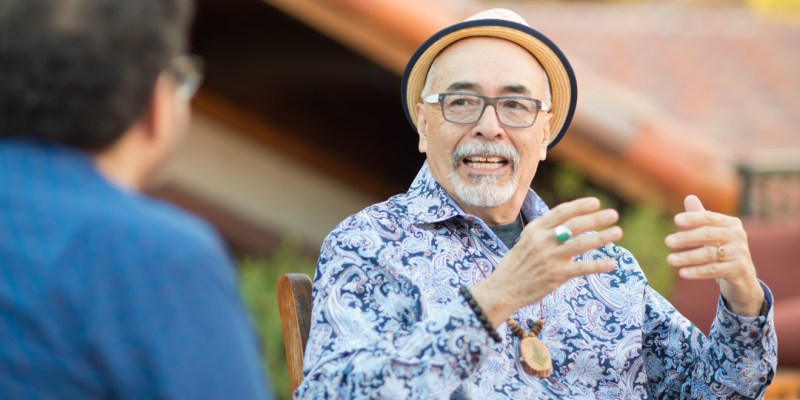As the first Chicano Poet Laureate of the United States, Juan Felipe Herrera M.A. ’80 says his art informs his activism. Born to migrant farmworker parents near Fresno, Herrera was active in the Chicano Movement of the 1960s and has been a longtime public advocate for the arts, founding multiple community theaters throughout California. Herrera served as the California poet laureate 2012-2015 and is currently serving his second term as U.S. Poet Laureate.

The Stanford Daily (TSD): What was the hardest poem you have ever written?
Juan Felipe Herrera (JH): One I didn’t have a feeling for. It’s like the hardest dance you’ve ever danced – the one you didn’t have a feeling for. So you’re just stuck up there dancing like a chicken. The hardest [poem for me] was way back in time, I remember taking almost like a year, it was very sad. I couldn’t get it together.
You know what happens when it turns hard? When you get to that point, move on. Leave it. It’s closed. As a matter of fact, get a pencil and write some Cubist-style poetry. Make the style talk and the words remain as simple as they are. Simple words, simple style. So now play with the power of lines, play with the spelling, play with the spacing. Have fun there and make the poem really come alive.
Sometimes you do step back, and you write a more quiet piece, perhaps more critical and philosophical, and you challenge yourself. It takes time.
TSD: During your reading, you invited the audience to read along with you for poems such as “Aztec Invasion,” which have lines in both Spanish and English. What advice do you have for bilingual artists – such as some Chicanos – hoping to explore their identity through art?
JH: Bilingual, trilingual, quadri-lingual – find as many ways of speaking [as you can]. What is the bilingual style? Get into it, and then add more elements. So much is available. Feel free to create a mariachi verbal orchestra.
When I’m traveling, I pick up The New York Times a lot. There was this report [on] the Women of Atenco. These are women who have been protesting in a small town. It’s the most dangerous thing you can do, like the Ayotzinapa protesters. The women got apprehended, arrested, thrown into a cell, abused. They lost a lot of strength they had. That’s a different kind of poem, documentary-style.
TSD: Did you end up writing a poem about that?
JH: Some subjects are just so deep and so big they are hard to write about. You can do it, but you really have to walk cautiously and with a lot of heart and reality. So I wrote something. I haven’t read it. You can have the voices come out in Spanish, you can have a conversation, you can have a pointillist Spanish, English, Spanish, English. I would definitely expand what’s been done.
TSD: Can art ever be successfully divorced from who we are?
JH: It cannot be done. Art is a social construct. And if you are the maker of it, how can it be divorced? You can say that tree is art and I’m over here. That’s kind of divorced, but your perception has already tagged it. A tag is the beginning of art.
Depends on the society we are in, too. In indigenous societies, there really is no word for art unless it’s a colonial word. Everything is one. Oh! That’s art. I love the textiles, I love the beads, I love the songs. I can’t believe the music and the dance. But they don’t call it art. So maybe that’s when it’s divorced, because there is no name for it. You don’t say poetry. You are just working within your cultural space, but to us it sounds like poetry.
TSD: Many of your poems, such as “Borderbus” and “America, Stop Deporting Us,” are politically engaged and resonate with the experiences of Latinos and Chicanos. As the first Chicano Poet Laureate, how do you view the relationship between your poetry and your activism?
JH: I see it as the same thing. It depends on how you define activism.
TSD: How do you define activism?
JH: Activism is our orientation of the world – seeing ourselves as a part of society. We can go around thinking that we’re divorced from society, but we’re not. And therefore we do things [such as] throwing a piece of paper on the ground, big deal. I used to do that, I used to think: What’s wrong with littering? And now it’s the last thing I want to do, because every act creates an outcome, and every outcome impacts the motion of society.
Poetry is a big part of my activism. You’re calling on history, you’re calling on voice, you’re bringing people into rhythm and it’s like you’re creating a microcosm of society for 15 minutes, and then it disbands. Imagine that.
Martin Luther King Jr. and Malcolm X built a movement out of words – and look what happened.
TSD: What has been your proudest accomplishment during your tenure as U.S. Poet Laureate?
JH: Going around and seeing so many beautiful people and learning. It’s like getting on a train and going through different villages and towns and noticing everything and just being struck by it and being bowled over by it. Just throwing myself into everything, and having everybody throw themselves at me. Being present to everybody, listening, taking notes and transmitting the stories.
I also am proud of my online projects such as “Casa de Colores” and “Technicolor Adventures of Catalina Neon” for second and third graders. They’re building a book together nationally, and I assist in putting the stories together. An illustrator does the illustrations. I sewed some of their idea together, I worked the loom. And God, they’re fabulous. A lot of energy.
This transcript has been lightly edited and condensed.
Contact Miguel Samano at msamano ‘at’ stanford.edu and Aparna Verma at averma2 ‘at’ stanford.edu.
